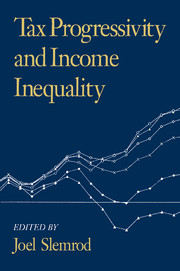Book contents
- Frontmatter
- Contents
- Preface
- List of contributors
- 1 Introduction
- 2 Trends in federal tax progressivity, 1980–93
- COMMENTS
- 3 The lifetime incidence of state and local taxes: measuring changes during the 1980s
- COMMENTS
- 4 Trends in income inequality: the impact of, and implications for, tax policy
- COMMENTS
- 5 The efficiency cost of increased progressivity
- COMMENTS
- 6 On the high-income Laffer curve
- COMMENTS
- 7 Tax progressivity and household portfolios: descriptive evidence from the Survey of Consumer Finances
- COMMENTS
- 8 Progressivity of capital gains taxation with optimal portfolio selection
- COMMENTS
- 9 Perceptions of fairness in the crucible of tax policy
- COMMENTS
- 10 Progressive taxation, equity, and tax design
- Index
COMMENTS
Published online by Cambridge University Press: 20 May 2010
- Frontmatter
- Contents
- Preface
- List of contributors
- 1 Introduction
- 2 Trends in federal tax progressivity, 1980–93
- COMMENTS
- 3 The lifetime incidence of state and local taxes: measuring changes during the 1980s
- COMMENTS
- 4 Trends in income inequality: the impact of, and implications for, tax policy
- COMMENTS
- 5 The efficiency cost of increased progressivity
- COMMENTS
- 6 On the high-income Laffer curve
- COMMENTS
- 7 Tax progressivity and household portfolios: descriptive evidence from the Survey of Consumer Finances
- COMMENTS
- 8 Progressivity of capital gains taxation with optimal portfolio selection
- COMMENTS
- 9 Perceptions of fairness in the crucible of tax policy
- COMMENTS
- 10 Progressive taxation, equity, and tax design
- Index
Summary
Steve Sheffrin's paper suggests some disturbing, but perhaps unsurprising, findings about public perceptions of taxes. The findings indicate that the public has a limited knowledge of the subtleties of economics. Indeed, there appears to be little understanding of notions such as incidence and tax shifting, economic efficiency, and implicit taxation. For this reason, the public seems particularly willing to accept corporate taxes, although economic analysis of these taxes – whose incidence is uncertain and whose efficiency costs are large – does not tend to give them high marks. More fundamentally, the public has poor factual knowledge about the tax system (e.g., they inaccurately estimate rates) and seems unusually swayed by the visibility of taxes.
At the same time, there is evidence of public support for progressive taxation, although this view does not seem to be reflected in fundamental attitudes toward specific taxes reported on surveys. I might add, by the way, that the part of the paper I found least satisfactory is the notion of a broad middle class where “equals” would be defined and equally treated to proportional tax rates. I don't find it plausible to suggest that those with incomes ranging from (say) $20,000 to $80,000 should be thought of as similar. We may all think of ourselves as middle-class, but I suspect the vast majority of individuals would characterize these income groups as highly unequal.
Sheffrin's findings of limited information should not be so surprising.
- Type
- Chapter
- Information
- Tax Progressivity and Income Inequality , pp. 335 - 340Publisher: Cambridge University PressPrint publication year: 1994



